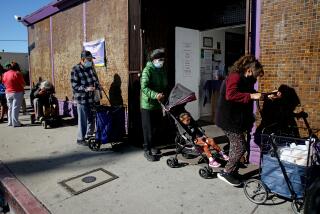Legislation to Help the Homeless Advances
- Share via
SACRAMENTO — Legislation to combat chronic homelessness on Los Angeles’ skid row and in other places around California where the dispossessed congregate is on track to become law after receiving approval from a key Assembly panel Thursday.
The package of bills includes a $150,000 pilot program in Los Angeles County Superior Court for probation supervision and treatment of nonviolent offenders with mental health or substance abuse problems or both.
The legislation would also require all municipalities to devise plans to help their homeless population rather than dump them in other areas where treatment programs already exist.
In addition, people convicted of peddling drugs within 1,000 feet of homeless shelters and drug treatment programs would have a year added to their sentences. The legislation had called for a two-year sentence extension, but that was cut in half by the Assembly Appropriations Committee, which approved the bills Thursday. The measures will be voted on sometime in the next two weeks.
Lawmakers dropped an idea pushed by businesses and developers to ban people on probation from entering the area of Los Angeles bounded by 3rd, Alameda, 7th and Main streets. Lawmakers abandoned the proposal out of concern that it would not survive a court challenge.
“We’re taking action to make sure that the people who need the help get it,” said Assembly Speaker Fabian Nunez (D-Los Angeles). “But we’re also taking action to see that those who prey on the homeless get dealt with adequately.”
The bills are in addition to money lawmakers added to the state budget in June to help California’s skid rows.
At that time legislators added $8 million for drug courts and $5 million for homeless family assistance, to help protect those teetering on the edge of eviction. The state also boosted from $40 to $65 a night the stipend for emergency housing, which is available once in a person’s lifetime for up to 16 days straight. And counties can now provide financial assistance to families before they become homeless.
Michael Tynan, supervising drug court judge for L.A. County Superior Court, said he hoped the pilot program could deal with 50 to 100 people a year from the downtown homeless population, which he said numbers in the tens of thousands.
“If we can demonstrate that some of these programs work a whole lot better than others, then we can motivate the City Council, the Board of Supervisors and the state to fund these things adequately,” he said.
Carol Schatz, president and chief executive of the Central City Assn., a business advocacy group, praised the overall package but expressed disappointment that the drug dealing penalty had been reduced and that lawmakers ditched the no-entry zone.
“We got a lot, but we didn’t get it all in,” she said. “I think it is very frustrating that we couldn’t get these simple bills through, given the enormity of the problem.”
Joel John Roberts, chief executive of People Assisting the Homeless, an L.A.-based service and housing provider outside of downtown, said that although improvements to the courts and the other changes might be merited, lawmakers needed to provide more money for housing.
“If you are going to do one, you should emphasize the other as well,” he said.
One of the more inventive parts of the package, lawmakers said, is aimed at preventing the practice of dumping, in which communities tacitly -- and in some cases actively -- encourage their most troubled residents to migrate to existing skid rows because their own areas do not provide drug treatment services or homeless shelters.
“Downtown L.A. gets dumped on. Santa Monica gets dumped upon. Sacramento gets dumped upon. Truckee, Calif., gets dumped upon,” said Sen. Gil Cedillo (D-Los Angeles), who proposed several of the measures.
“Every community will have to take responsibility for poor people, homeless people and the various problems that lead to homelessness,” he added.
The League of California Cities as well as Torrance and the Sacramento suburb of Roseville oppose the measure.
The league said the bill usurps municipalities’ rights and will be costly.
The new legislation requires all counties and cities to designate acceptable zones for emergency shelters and transitional housing.
It would prohibit the localities from refusing to issue permits for such facilities unless they had reasons aside from the nature of the population.
Los Angeles Councilwoman Jan Perry, who represents much of downtown L.A., called the approach “very realistic and relevant.”
“It’s a very good start if it gets out of their process and we can actually implement it,” she said.
Besides requiring approval from the full Assembly, the measures must also be ratified by the state Senate before the Legislature adjourns at the end of the month.
Gov. Arnold Schwarzenegger has taken no position on the legislation.
More to Read
Get the L.A. Times Politics newsletter
Deeply reported insights into legislation, politics and policy from Sacramento, Washington and beyond. In your inbox twice per week.
You may occasionally receive promotional content from the Los Angeles Times.










